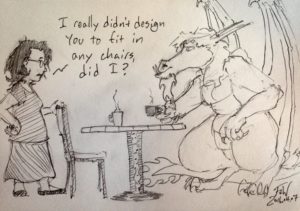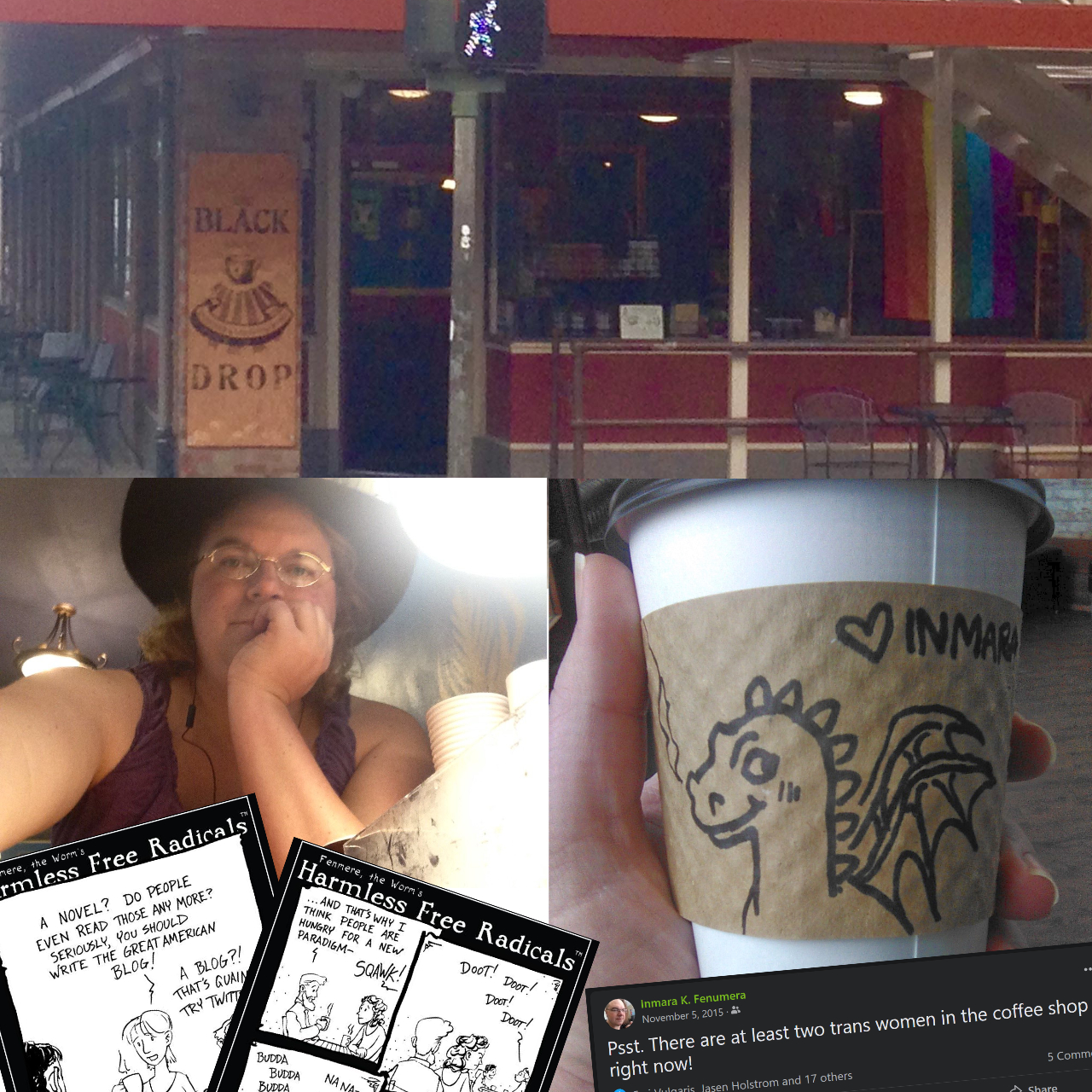Hello,
I’m Fenmere. I’m writing this article because I’m the one of us that people will remember the most clearly when thinking of the Black Drop Coffee House, in Bellingham, WA, which is closing for its final time today at 3pm.
It feels a little weird, as someone who is anti-capitalist, to be lamenting the closing of a business. But spaces for marginalized people are critical in this world, and in the U.S. you just cannot have such a space that is well known and public like the Drop was without it being a business. At least, I’ve never seen one. Even non-profits are businesses. And the Drop was public enough to get several newspaper articles about it and a string of awards throughout its existence.
Its closure is a tragic loss, though its existence will be eternal (in my estimation at least), burned indelibly into the points of space/time it has existed between 2001 and now, and echoing in the souls of everyone who has called that place their home. The community that was built there will continue for quite some time, as well, and grow, and plant the seeds of new community. But the history of the place is important to document, and here is my perspective of it, and what I and others of the Inmara can remember.

If you’ve been there at all, you’ve probably seen me and the rest of my system, the Inmara, either drawing comics, stamping cups, or proudly infodumping about all manner of things in the lobby. We presented rather differently throughout the years, though. Sometimes you saw a person in a long coat, fedora, and beard, and later you may have seen someone in a dress, clean face, and pigtails bouncing to music in their headphones while zoned out over whatever they were doing. That fluidity in our presentation is part of what made the place so critical to Bellingham. At every step of our development as a people, the Black Drop was always the first place, and often the only place, where we could safely be out and proud about who we were.
The staff there adapted with a cheerfulness and nimbleness we have not seen anywhere else in our lives, whenever we changed our names or pronouns to try them out. Even when we came out as plural, they rolled with it, with one barista even saying, “Oh! That makes sense now why you have so many voices! Congratulations!”
And, while we came out and began to explore ourselves in 2015, it was a haven for people like us long before then.
I think I may have walked in there on the first day they opened. If not, it was the second or third. I had been eagerly awaiting their opening.
I’d been making and publishing my comic for a year, and looking for subjects to write in my blog, hosted below the comic page. Since Harmless Free Radicals (HFR) largely took place in coffee shops, where I would sit and draw it most of the time, I had developed the habit of trying every new espresso stand and coffee shop I found in Bellingham, to welcome them into business and thinking about breaking into reviews (which I never really did). But also, I had just started distributing HFR on little handbills for people to pick up and collect. So, one day, as I was making my comic delivery rounds, I came across this cordoned off shop that was under construction with a big sign on the front that said, “The Black Drop” and had a logo of a girl holding a gigantic cup of coffee in her lap. And that girl, now affectionately called the Maniac and owned by Maniac Roasters, looked remarkably like my lead character, Jenifer.
I had to start distributing HFR there.
So, the first day I walked in to order my regular drink, a double tall mocha with no whip, I immediately asked the opening owners, Teri and Alexarc, whether I could leave a stack of my comics in their lobby. Terri replied, “Oh, of course!”
Then I drank my mocha and almost immediately stopped having coffee anywhere else.
There were exceptions, of course. But, if I was the one making the choice I took us to the Drop. Their coffee was so much better than anybody else’s. And, actually, their whip cream was consistently good enough I started having it again eventually.
The other thing that happened that day, as I was waiting for my drink, is that I introduced myself with our deadname and then my own name, and they said, “OK, we’ll call you Fenmere, then. Because there are already too many people with your given name, including one of our baristas. Is that your LiveJournal handle, too? We all go by our LiveJournal handles here anyway!”
So, everywhere else I went in town, I was known by the name our parents had first given us, but at the Black Drop I was addressed by the name I put on the comics. And that had a weird and cool effect on our psyche that the others in our system noticed before I did. Sometimes my name felt right, and sometimes the other one did, and our plural egg carton began to break just a little. Still, though we had a moment where we damn near thought we really had DID, it would take 15 years to complete that process.
Mostly, that dichotomy lead us to feel like we were a superhero with an alter-ego, and that the Drop was our secret lair where we did our work. And the regulars and the staff there our network of civilians helping us fight evil with our work.
I started going there every day I could to set up shop on the front most table near the line of customers waiting to place their orders, facing them with an open seat conspicuously pushed out just enough to be inviting.
People would see me drawing comics and sit down to talk, and it was the best thing.
I made so many friends that I still have that way.
But also, I got to watch the antics of the baristas and customers and incorporate them into my comics. And when things were slow, we’d talk about possible punchlines. Many of my gags came directly from the staff.
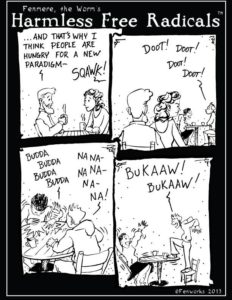
We observed all sorts of human behavior that way, too, including the tendency for men to take women to coffee shops on dates in order to talk loudly at them about their favorite hobby, like, uh, we would do to anybody who had the poor decision making skills to sit down at our table. The difference being that people usually asked us to talk about our things, where the women on these dates usually looked like they wanted to chew their leg off to escape. We also noticed other courting rituals. Especially after we started the Bellingham School of Comics and started meeting what would become our first queer family.
Near the middle of 2004, we were finally, after six years of off and on again attendance, wrapping up our bachelor’s degree in drawing. And we were lamenting to a few of our classmates that we needed the environment of working with other artists around us, like in a studio, to keep up with our drawing and cartooning.
With nods of agreement, we all decided to start a cartooning club, which my headmate Eh suggested we call “The Bellingham School of Comics” or “B.S. of Comics” for short. Everyone loved the idea. We asked the Drop if we could meet there, of course, and then made posters.
Within a month of starting the group there were over 30 members who would rotate through the meetings, some coming on Tuesdays and others on Saturdays, and sometimes we’d fill the whole shop with both aspiring and professional cartoonists. Almost all of them were queer in some way, which we didn’t realize right away. Many of them were trans.
Over the course of the next ten years, we had several B.S. of Comics group art shows in the lobby of the Drop, attempted to publish our own comics newspaper and distribute it there, and met ten other trans people in the process. All of them happened to be trans masc, men and enbies.
Also, one of the very few presumably straight members of the B.S. of Comics, Eric Iverson, introduced us to the woman we would marry, and who would help save our life during the tumultuous years surrounding our transition, Julie. Although we are now divorced, we truly do owe our life to Julie, and by extension to Eric, and the B.S. and the Drop. Of course, we don’t really know what would have happened if we hadn’t found the place, but this sequence of events is so important to us for so many reasons never-the-less.
It’s also an example of the circles and circles of relationships that surrounded that place, because it turned out that Julie was old friends with one of our other best friends at the time, George Hossaphat (a.k.a. Nathan Dodge), and they’ve now been in a band together since July 3 of 2005 because George asked us if we would be his bass player and we said we were dating one. Those kinds of closing circles kept manifesting with every string of new friends we made there.
Some of those circles have reached to Seattle or Portland and back. And, yes, they are more endemic to Bellingham at large, and just people up and down the I-V corridor. But, again, it was our experience to see them completed while drawing comics at the Drop while talking to our friends about things we just could never talk about in most other shops.
Mind you, the banter during the B.S. of Comics did challenge the staff occasionally, and I did have to remind some of the younger members to tone it down or a barista would show up with the “This is not your clubhouse” bat, which had been made originally for the first group of regulars who were friends of Teri and Alexarc.
There was, for a long time, a sort of raucousness behind the scenes that forged some of the deepest bonds there, and that also lead to the development of Black Drop run community events, such as the infamous Peepfest, and the Save Our City: Zombies v.s. Survivors city wide water balloon fight, which ran for 10 years!

The Drop has also been used for various personal events, such as birthday parties, games, many, many employee functions that regulars were also invited to, and our friend Eric’s own wedding, where we dressed weirdly like Theodor Roosevelt as his best “man”. (We were not a man, even then. None of us were.)
And, like most coffee shops, they would showcase a new artist on their walls every month. Their waiting list for a show got to be as long as eight months. So, of course, we had a handful of our own shows there, including one where our artist’s statement was simply: “Dragons. Dragons dragons dragons dragons. Dragons dragons. Dragons dragons dragons. …” We’d completely forgotten about doing that until one of our old friends there mentioned it to us last week as one of the funniest things they’d seen as an artist.
Julie even got to have a show there of her photography.
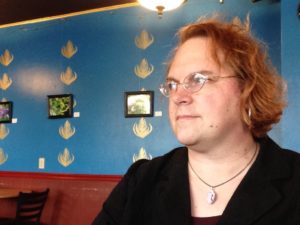
All these little things were the minutia of the daily operation of what could have been any coffee shop, each one maybe only hinting at what the place would mean to us later. Other places have been kind of like this, or better maybe, but this was our place.
And we became more proud of it when Teri and Alexarc delved into roasting their own coffee and then chose to sell the Black Drop to their employees. This did end up changing the atmosphere of the shop for many people, but such changes are often vital to the continued life of any group of people. And the B.S. of Comics was going through similar changes, with members leaving for other cities while new ones came to be part of the group and it became even more queer.
While we started listening to our friends at the B.S. talk about their experiences with transition, dysphoria, and navigating life as a trans person, trying to decide if we too were trans, the ownership of the Drop fluctuated and dwindled down to Stephanie, her husband John, and Ryan, and they hired new baristas to take over and fill in, and to delegate tasks and management to. And then, by the time we ourselves had come up against the wall of our own dysphoria, in 2015, half the staff was trans and more than half were queer.
The Black Drop was the first place we were able to be out publicly, and it was the first place where we changed our name in the records and heard our new pronouns all day.
Unfortunately, by then, we were unemployed and could not work due to our disabilities. Which meant that we didn’t have the money to visit the place as frequently as we used to, and didn’t know when we would.
Ryan called us out of the blue one day and asked us if we would stamp their cups at our own pace in exchange for store credit. He specifically said that this was to give us the ability to continue to hang out there. And we agreed on the spot.
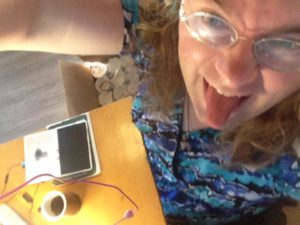
At a time when we were burnt out on drawing, buckling under massive C-PTSD triggers, feeling isolated in the neighboring town of Ferndale, and alienated from much of society by transphobia during the early years of our transition, this was critical to our survival. Not because it provided us with sustenance, but because we got to keep our true home. If we managed to stamp a box at our fastest pace, we could earn up to $20 an hour at the rates they gave us. But we were allowed to take as long as we need, and we often needed all day. And since we were not doing this to pay for any bills, and it was essentially an autistic stim, it didn’t trigger us in any way like actual employment and contract work did. It felt more like a volunteer activity that we were doing to help out our friends, and the baristas regularly thanked us for doing it because they hated the job.
This is one of the first things about the Drop we started to cry over, long before we got any whiff of an imminent closure, for years, because it meant so much to us.
And for about five years, every paper to-go cup had been hand stamped by an intersex, autistic, asexual, biromantic, trigender, trans feminine, non-binary plural system full of dragons, girls, and id monsters.
While just across the street, supplying the Drop with a steady supply (but not a majority) of customers, was Logos Bible Software (now Faithlife). The bulk of those customers usually took their coffee to go, and not all of them were totally wrapped up in the culture of that company, but it did result in regular exposure to people “in ministry” sitting in the shop to talk about managing church programs and such. Which was interesting because of how blatantly and utterly queer the shop was by that point. The coffee was brewed and roasted by queer people, and the cups stamped by us.
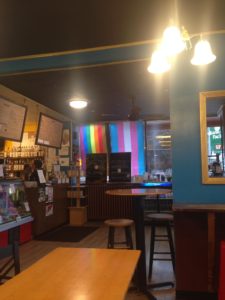
Not that Christianity in general is opposed to queerness, nor that there aren’t Christian queer people, and for the most part these groups drank coffee in harmony within the walls of the Black Drop, and even just outside. But, eventually, there was an altercation that we were a part of, because there are some people “in ministry” who have a distinct anti-queer agenda. And some of them seek out places like the Drop to challenge and confront what they see as evil.
And this was in the first year of Trump’s presidency.
The Drop was full of people, almost all of whom were sitting along the walls or crowded near the front door. Almost all of the middle tables of the room were empty, except for the table we were seated at, and a smaller one where two men were seated, talking politics.
Their words caught our ears when one of them said, loudly enough for everyone to hear, “Those people talking about punching Nazis are the real fascists. They’re the real problem.” And from there until our confrontation, they peppered their language with dog whistles aimed at queer people and implications that liberals and leftists were to blame for the country’s ills. Finally, as they were wrapping things up and getting ready to leave, the other one said, looking around at the obviously queer coffee shop they were in, said, “It’s come down to the pedophiles v.s. the Christians.” He was clearly equating queerness with pedophilia, without explicitly mentioning queerness. A nasty gotcha technique employed ubiquitously by everyone on the right, and extremely obvious in the context with his body language.
At that, we slammed our phone down angrily on our table and glared sternly at him, unblinking. We wanted to say something pointed, such as to call out his bullshit, but we had become non-verbal.
The sound startled the guy who’d spoken that, while his friend was already walking out the door. He looked at us transfixed and confused for a second, then scowled and picked up his coat and put on his backpack as he got up. But two steps from his chair, he made a dramatic sigh, letting his frame drop like a rag doll before pulling himself up with a deep breath and bringing his foot down in a stomp that was so loud and shaking it disrupted the entire coffee shop.
Then he turned to us, a very clocky trans woman, and shouted with all of his might, “You’re an abomination!” and stormed out.
The staff 86ed him on the spot. And we didn’t see his like again for a while. And the rest of the customers spoke with us about our experience, supporting us and thanking us for standing up to him.
In July of 2019, though, a regular started wearing his Trump hat in the Drop while ordering his coffee. Eventually, Stephanie gave her baristas permission to disallow the hat as hate speech based on the strength of the shop’s policy against discrimination and the things that Trump and his supporters had been saying publicly by that point.

A lot of shops had signs like that, and the Drop was certainly not the first to ban Trump hats. And we’re not saying that theirs was the only staff that backed up that promise, but rather that simply they did, and that that was important to what made this place our home and our family. Just like with other places similar to it. Many of which have had to close permanently due to covid as well. Queer owned cafes and other establishments get hit harder during these kinds of national disasters, because they have less money behind them. Queer people earn less on the dollar and have fewer family supports to help keep them going.
Anyway, it turned out that this regular was a lawyer, one with a couple of sanctions against him by the local Barr association, and thought he could make some sort of scene out of this ban. So one day, while we were there, he came in wearing his hat, with a handful of his friends, one of whom was recording the incident on his phone.
The staff were clearly rattled by this, but doing their best to hold their ground. And we immediately thought that we needed our own recording of what happened so that we could share it unedited. And here’s how that turned out:
If you don’t want to watch that, or can’t, these guys were 86ed, too.
A summary of the event is that we caught one of them looking directly at our crotch for a prolonged time, which he brushed off with a veiled insult when we addressed him for it. Then, we spoke up to explain to James, the lawyer, that the Trump hats were hate speech. He objected while also misgendering us, which we called him out on thus giving the baristas the ammunition they needed to escort him out.
And after that, we saw none of these men again. Or anyone else like them.
The shop remained resolute in its stance against hatred and discrimination, and became an even safer place for people like us to exist.
There might have been another incident or two, though we never heard of any from the staff, and they’ve talked about this one with the Trump hats ever since, even just yesterday. We do recall a couple cases of vandalism they had to clean up, of course.
Shops like the Black Drop become obvious targets, even in liberal college towns like Bellingham.
Of course, it was so much more mild than the stories we’ve heard of queer places in the eighties and nineties, when we were growing up. And nothing remotely like the Pulse massacre in Florida. But standing your ground to these little tests is vital. It keeps Nazis and other hateful groups from sneaking in and taking over covertly, which was definitely beginning to happen by that point. And a stop was indeed put to it.
We think it was by then that Ryan had sold his portion of the shop to Stephanie and John to move to Seattle and take a higher paying job to support his family.
Then the pandemic hit just as the Drop beginning to move into their new space across the street. A space that would help them remain open as long as they could through the economic hits of covid 19. It had a taller ceiling, better ventilation, and much more space. It had an excellent flow of traffic, where customers could come in through one door and leave through another without crossing paths.
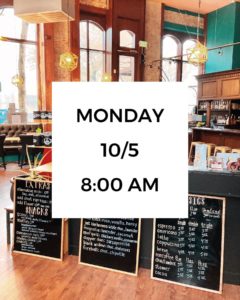
And it would have been a glorious space for gatherings such as the B.S. of Comics if only covid hadn’t made that impossible.
We had to stop stamping cups around the same time because we had been feeling sick and feared we might have covid ourselves, and then our mental and emotional disabilities got worse during the pandemic and we didn’t want to add another body to the shop while we would likely take even longer to get through a box of cups. This meant that we could not visit nearly as frequently ourselves. But we did go down there at least once a week, using money from a friend or our parents, while it was open.
And then our housing in Bellingham ended, and we had to move in with someone else who could support us, and in November of 2020, we moved to Portland.
Leaving Bellingham tore us up. We became dissociated and removed from our emotions so much that when one of our partners died on January 6, 2021, it barely touched our conscious mind. And we were already fearing that the Black Drop would be forced to close while we were away.
We kept in touch over Facebook, following Stephanie’s account since we’d migrated from LiveJournal with her as well. We perhaps knew more of the behind the scenes struggles than most people, though there were others closer to them that were living it first hand.
The pandemic resulted in a 70% drop in their business. And with no help from the government after the first six months of the disaster, they just could not keep going. And a year after we moved, the winter was harsh and hit the Drop with frozen pipes that turned out to be a nightmare to fix in an old, out-of-code building, and that was the last straw. But even if the pipes hadn’t frozen, they could not have lasted without a sustained uptick in business.
In the mean time, we were suffering more and more from subconscious turmoil and the need to cry, sob, punch things, and generally have an autistic meltdown without the actual ability to let go or consciously identify what the problem was.
Then, Friday, a week ago, the Black Drop announced their imminent closure, and it hit us. The announcement felt like relief! Bitter, bitter relief. Horrified relief. The same feeling we’d had when our partner had died, after years of pain and struggle. The same feeling we’d had when our grandfather had died, after years of decline and confusion. We’d been dreading the day we’d lose them, and then it was suddenly done. But this time we could actually cry. And we knew we had to come say our goodbyes to the place, and to say “hi” to the owners and staff and give them our condolences, during their last week.
One of our friends there told us, “I can’t look at you very long or I’ll cry.” And then gave us the gayest mocha we have ever received there.
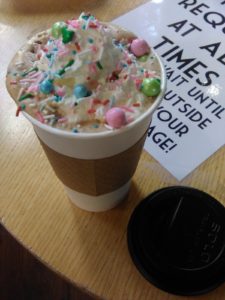
And today, when we went in for the last time, she drew a dragon for us on the sleeve of our drink.
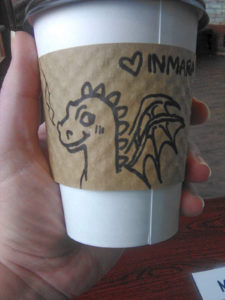
And in this story I’ve told, I haven’t really even begun to touch on how much impact the Black Drop had on our lives, and the lives of our friends who also lived there. And the mix of emotions that we’re having isn’t even as wide and difficult as those of the staff and other regulars. Stephanie is working on a commemorative project with as many of the former employees she can get in touch with, and collecting photos from regulars and employees alike to fill it out. And we will share a link to that here when it becomes public.
But, for us, if that shop hadn’t opened in the fall of 2001, we would be a very different group of people today, and very possibly, literally dead. We had over 40 suicidal episodes between 2012 and 2015 due to our dysphoria before we came out as trans and then plural, and we’d become so disabled we could no longer work. We needed the Black Drop and the community we’d built there in every way to make it through that. It’s been said that the first two years of transition are the hardest, and they certainly were for us. But to have a place where we could publicly come out the very next day after we realized we were trans and to be celebrated on the spot with hugs and free drinks and family ready to accept us without question was invaluable.
And to have that place be the one with so many good memories of being accepted, fitting in, and celebrated for our unnamed weirdness, surrounded by people like us, for over a decade in the dysphoric before-times is something that leaves even me, an autistic poet and cartoonist, without any more words.
